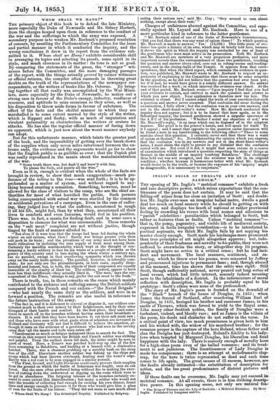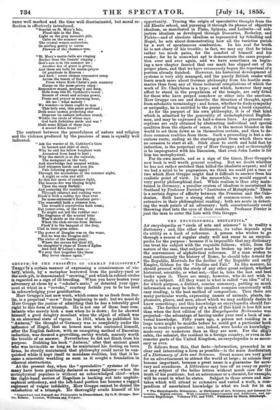INGLIS'S BRIAR OF THREAVE RED LILT OF BARHOLIL *
THE opening of Mr. Inglis's " metrical romance" exhibits a fresh and rare descriptive power, which raises expectations that the con- tinuance of the poem does not sustain. It may be said that the falling-off arises from too close an imitation of Scott: and doubt- less Mr. Inglis over-uses an irregular ballad metre, dwells a good deal too much on local scenery while he should be getting on with his story, and displays too much of national or rather provincial feeling by crowding his verses with local names and allusions to "parish celebrities : ,peculiarities which belonged to Scott, bat rather as features than as faults. Unless "metrical romanoe"— that is, the pomp, pageantry, and visible life of mediaeval society, expressed in facile irregular versification—is to be interdicted to poetical aspirants; we think Mr. Inglis fails by not copying his master closely enough. Scott made his landscapes more prominent than true principles of art might altogether approve ; but, inde- pendently of their freshness and novelty to his public, they were not suffered to overwhelm the story, or altogether stop its progress. Scott might have no action in a critical sense ; but he had mei- dent and movement. The local manners, sentiment, and ea- louring, which he threw over his poems were oenaured by Jeffrey and pronounced injurious to permanent l'ame ; and, though abused at the moment, time has shown that the eritie was right, Still Scott, though sufficiently national, never poured out long series of local verses, which had little interest, scarcely indeed meaning- save to the inhabitants of a district. In the intermixture of moral reflection with description, Mr. Inglis is probably equal to his prototype : Scott's .ethics were none of the profoundest.
The story of Mr. Inglis's poem is founded on the downfall of the " Black " branch of the house of Douglas, in 1455 ; when James the Second of Scotland, after murdering William Earl of Douglas, in 1451, besieged his brother and successor James, in his castle of Threave, which was forced to yield to the Royal arms. Like many other Scottish nobles, the family of Douglas were a turbulent, violent, and bloody race ; and as James is the villain of the poem, his deeds and character do not suffer in the verse. In a critical point of view, too much prominence is given both to him' and his wicked wife, the widow of his murdered brother ; for the romance proper is the capture of the hero Roland, whose father and clan the Douglas has just destroyed, Roland's fidelity to his lady- love when tempted by Margaret Douglas,- his liberation and final happiness with the lady. There is scarcely enough of novelty here for a high-class poem even of the ballad romance; and its treat- ment is not judicious. The licentiousness of LaccyraiDkouglas is- made too conspicuous ; there is an attempt at melodramatic dap- trap, for the hero is twice represented as dead and each time- comes to life again. The great causes of ill success, however, are the faults already intimated—the substitution of description for action, and the too great predominance of district pictures and ideas.
If these faults can be overcome, Mr. Inglis may yet succeed in metrical romance. At all events, there is m him striking descrip- tive power. In this opening scene, not only are natural fea-
• The Briar of Threave'ind the Lily of Barholm : a Metrical Romance. By Henr Inglis. Published by Longman and Co.
tares well marked and the time well discriminated, but moral re- flection is effectively introduced.
"Sunrise on St. Marrs Isle, Flood-tide in the Dee, Light on the gray monastic pile, Calm on the summer sea ; The crystal waters motionless, Or stirring gently to caress Flowers of the chestnut-tree.
"St. Mary's matin-bells are ringing Earlier than the linnets' singing ; God's sun is in the summer air ; Another day of grace is given, And these are bells for matin-prayer Of gratitude to Heaven : And hark ! sweet chimes responsive creep Across the bosom of the Dee, From where Kirk-Christ's pale nunnery Hangs on the moss-grown steep : Responsive sound, prolong'd and deep,
Bells from Old St. Cuthbert's tower ;
Sounds of sweet and solemn power, Peace and prayer at morning hour, Ah me ! what melody ! We wonder—is there ought to mar This holy rest, this peace profound ; Doth some unseen protecting star Dispense its radiant influence round, Within the cirule of whose rays God bath forbidden strife and war ?
Rath some Elijah of these days A second Eden found ?"
The contrast between the peacefulness of nature and religion and the violence produced by the passions of man is equally well indicated.
" Ask the warder of St. Cuthbert's Gate
In bonnet and shirt of steel, Why he and his fellow burghers wait Accoutred from head to heel ; Why the match is at the culverin, The mangonel on the wall, And drawbridge fast secured within, And whispers harsh and iron din Pale listening groups appal ? Through the moonshine of the summer night, A night as calm and still As this fair morn of summer light, The beacon-fire was blazing bright Upon the steep Barhill:
And yesterday the tumbling river
Through cataract and rushing wave
Blush'd with a redder dye than ever
Its moss-embosom'd fountain gave : The cranesbill hath a crimson hue, The wreath'd convolvolus hath none; But yester-even, of the two,
Ye might not the ruddier one :
The fragrance of the scented briar Wax'd sickly at the close of day, When the rook-ravens from Balmae Flock'd to the banquet of the fray, Clad in their grim attire.
"The power of Douglas was on the wane, But he was the Douglas still : The victor of the battle-plain, Where the ravens fed their fill
On slaughter'd clans of Terre-d'Eglise And bold M'Lellan's men ;- We pray that tragedies like these May never chance again."



























 Previous page
Previous page